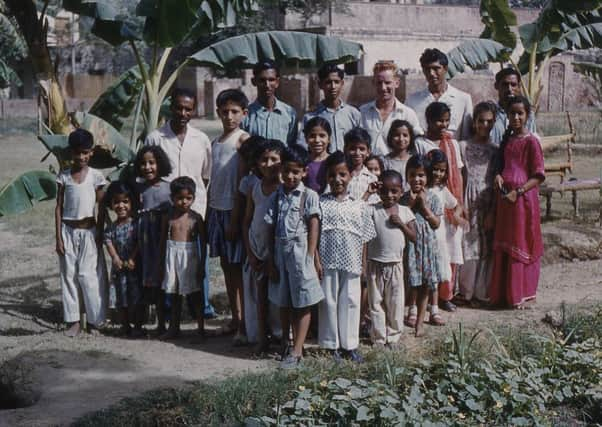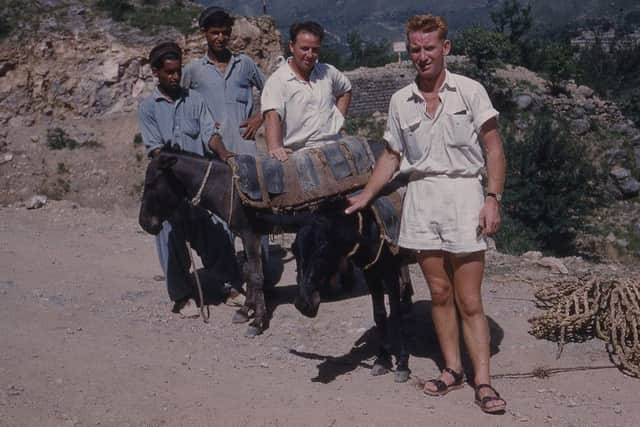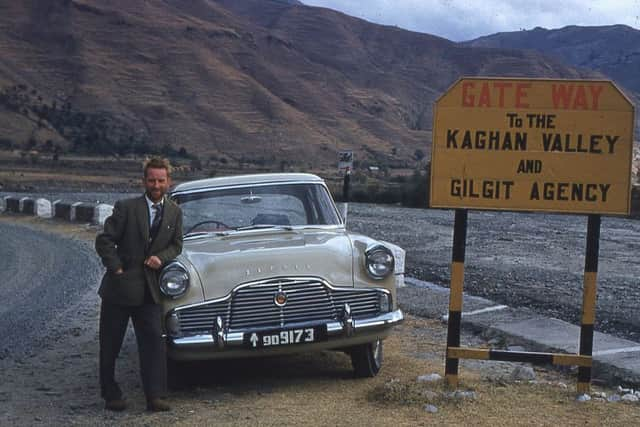The 1960s travel photos of a working class Greenock dad


Andy Gibb, a time served electrician, left his hometown of Greenock in the early 1960s to pursue well paid work in East Africa, Borneo and Pakistan with his firm, Paisley-based Balfour and Kilpatrick.
After investing in a Kodak Retinette 35mm camera and some colour film, Mr Gibb documented his travels for his family back in Scotland with slides of camel trains, Mughal gardens, border crossings, and market places making their way home.
Advertisement
Hide AdMr Gibb, usually suntanned and dressed in shorts, sandals and sometimes a floral garland, would also feature in the images that would appear on a projector set up in the sitting room of his family’s tenement flat.
His daughter, playwright Andrea Gibb, remembers well the slide shows that connected her and her brother to their father thousands of miles away.
In return, Mr Gibb’s wife, Becky, would regularly visit a photography studio in Greenock with the children, all dressed up to the nines, to document life and the growing family at home.


Now, after the slides were recovered from Ms Gibb’s attic, the images are being lovingly restored and digitised with hopes to mount an exhibition of the photographs which offer a rich document of a less-travelled time in far away places.
Ms Gibb said: “These photos are part of my childhood. We would look at them all the time and we had a projector put up in the sitting room for slide shows.
“They sum up who my dad was. Of course, I knew him as my dad but these images show him as an individual, as himself. They tell me so much about him. They are also very evocative of a particular time, like a little piece of social history.”
Advertisement
Hide AdWith well-paid work around Greenock hard to find, Mr Gibb would sometimes be away for 18 months at a time on jobs such as wiring up hospitals or government buildings. His wife, a homebird, preferred to stay in Greenock close to her mother but was supportive of her husband’s wish to work abroad.


As well as the pictures, Ms Gibb remembers the tokens of exotic travel that were brought home for the family.
Advertisement
Hide AdMs Gibb said: “I am ashamed to say it but we had a full tiger skin rug that my dad bought from East Africa. Sometimes I would lie on it, pretending I could fly.
“At Christmas, we would receive these amazing things. I always remember getting slippers with curly toes from Pakistan.
“My cousin got silk pyjamas, red ones and blue ones. We had these beautiful porcelain China cups that when you lifted them up would could see a picture of the woman’s face in the bottom, like magic.”


Every birthday, a cake would be delivered to the front door to much excitement.
“It was fantastic. I used to always think that it had come from wherever my dad was but of course it had probably come from Aulds down the road,” Ms Gibb added.
Ms Gibb described her father as “working class aspirational” and a man who wanted to do well for his family.
Advertisement
Hide AdShe added: “My mum used to always say he was a great provider and that is who my dad was. He also liked his clothes and cars. When he met my mum he had a MG sportscar which he sold to buy her a washing machine.
“He had a strong sense of duty to his family but at the same time he had this spirit that couldn’t be quelled. He had an absolute respect for everyone he met overseas and felt it an honour to be a guest in their country.”
Advertisement
Hide AdTime away home proved too tough in the end and Mr Gibb decided he didn’t want to travel alone anymore.


In the very late 1960s he was offered a job with family quarters in Nigeria - and Mrs Gibb agreed to go.
His daughter said: “We were a very close knit family. Everyone went for Sunday dinner at my nana’s. Suddenly, we were going away.
“My family found that a bit of a wrench but my mum agreed to go. We got a boat, I think from Liverpool, and it took us two weeks to get there. My mum was so seasick for four days but me and my dad and brother had an absolute ball on the ship.”
Eventually, the family settled into their new life with Mrs Gibb’s homesickness giving away to a new love for her ex-pat life.
Ms Gibb, aged around 10, returned to Scotland to go to school and came to realise there were many other children with similar lives, such as those whose father was in the army.
Advertisement
Hide AdShe added: “But to me, we had a different type of experience because my dad was working class.”
After being enrolled in boarding school, Ms Gibb and her brother needed to get a tuck box, a small trunk for food and personal items.
Advertisement
Hide Ad“My father went to Halfords and bought us a tool box,” Ms Gibb said.
Her parents ended up staying overseas until their sixties, with the couple seeking out a Caledonian Society in every country they stayed in, before returning home to Greenock. Mr Gibb died
She added: “At the end of his life, my dad was in a care home in Greenock with dementia. I always like to think that he was looking out over the water, not feeling like he was stuck in one room but looking out beyond, like he always did.”
Mr Gibb’s slides are being digitised by photographer Kathryn Wood, a graduate of Glasgow School of Art and the partner of Ms Gibb’s son.
She added: “Kat is doing them so beautifully, with such care. It’s lovely to think that she has now got this connection with these photos which mean so much to us all.”
The collection can be viewed on instagram at @gibbzer3
